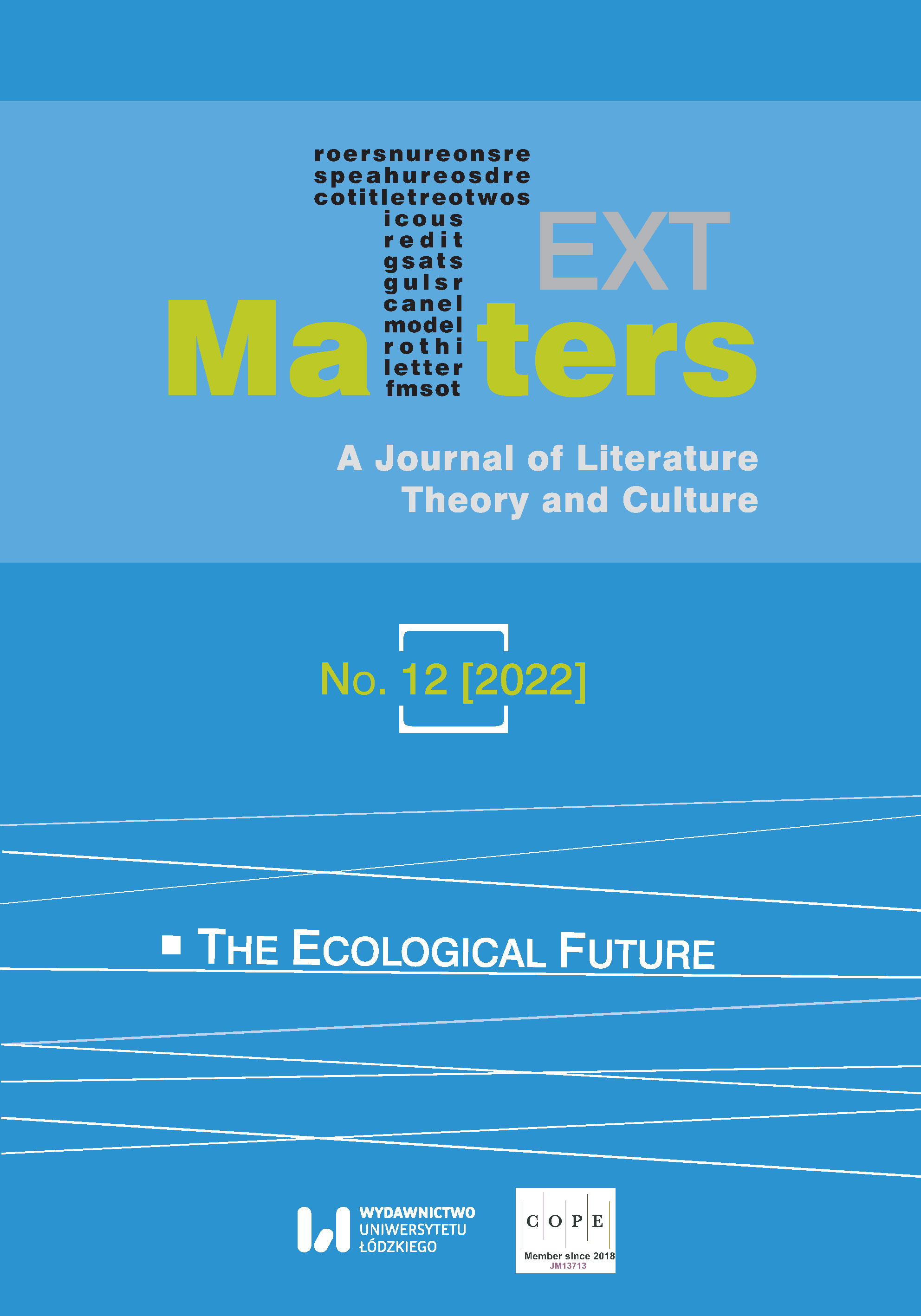Apocalypse . . . Eventually: Trans-Corporeality and Slow Horror in M. R. Carey’s The Girl with All the Gifts
DOI:
https://doi.org/10.18778/2083-2931.12.18Keywords:
environment, horror, trans-corporeality, apocalypse, zombie, The Girl with All the GiftsAbstract
This article examines M. R. Carey’s 2014 zombie apocalypse novel The Girl with All the Gifts through the ecofeminist concept of trans-corporeality as defined by Stacy Alaimo in Bodily Natures. Carey’s heroine Melanie showcases how humans can re-conceptualize their relationship to a more-than-human, or natural, world that is both exterior to the self and always-already a part of the self through fungal agency. Indeed, the novel continuously engages in intimate human-environment interconnections that, in their horrific capacities, are meant to inspire readers to reflect upon their own enmeshment in a larger, material world. The novel’s use of the real fungus Ophiocordyceps as the more-than-human agent that inspires the transformation of humans into zombies provides a vision for how humans can more ethically relate, in posthuman manners, to a more-than-human world. Finally, this article considers the novel as a depiction of slow horror, or a gradual descent into apocalypse.
Downloads
References
Alaimo, Stacy. Bodily Natures. Indiana UP, 2010.
Google Scholar
Babaee, Ruzbeh, Sue Yen Lee, and Siamak Babaee. “Ecocritical Survival through Psychological Defense Mechanisms in M. R. Carey’s The Girl with All the Gifts.” Journal of Science Fiction, vol. 1, no. 2, 2016, pp. 47–55.
Google Scholar
Bennett, Jane. Vibrant Matter: A Political Ecology of Things. Duke UP, 2010.
Google Scholar
DOI: https://doi.org/10.1215/9780822391623
Carey, M. R. The Girl with All the Gifts. Orbit, 2014.
Google Scholar
Christie, Lauren Ellis. “The Monstrous Voice: M. R. Carey’s The Girl with All the Gifts.” Childhood, Science Fiction, and Pedagogy, edited by David W. Kupferman and Andrew Gibbons, Springer, 2019, pp. 41–56.
Google Scholar
DOI: https://doi.org/10.1007/978-981-13-6210-1_3
Crane, Kylie. “Thinking Fungi, or Random Considerations.” Comparative Critical Studies, vol. 18, no. 2–3, 2021, pp. 239–58. https://doi.org/10.3366/ccs.2021.0405
Google Scholar
DOI: https://doi.org/10.3366/ccs.2021.0405
Domingo, Andreu. “Resilient Evil: Neoliberal Technologies of the Self and Population in Zombie ‘Demodystopia.’” Utopian Studies, vol. 30, no. 3, 2019, pp. 444–61. https://doi.org/10.5325/utopianstudies.30.3.0444
Google Scholar
DOI: https://doi.org/10.5325/utopianstudies.30.3.0444
Erman, Irina M. “Sympathetic Vampires and Zombies with Brains: The Modern Monster as a Master of Self-Control.” The Journal of Popular Culture, vol. 54, no. 3, 2021, pp. 594–612. https://doi.org/10.1111/jpcu.13024
Google Scholar
DOI: https://doi.org/10.1111/jpcu.13024
Gomel, Elana. “The Epidemic of History: Contagion of the Past in the Era of the Never-Ending Present.” Embodying Contagion, edited by Sandra Becker, Megen de Bruin-Molé and Sara Polak, U of Wales P, 2021, pp. 219–34.
Google Scholar
Hale, Kimberly Hurd, and Erin A. Dolgoy. “Humanity in a Posthuman World: M. R. Carey’s The Girl with All the Gifts.” Utopian Studies, vol. 29, no. 3, 2018, pp. 343–61. https://doi.org/10.5325/utopianstudies.29.3.0343
Google Scholar
DOI: https://doi.org/10.5325/utopianstudies.29.3.0343
Nixon, Rob. Slow Violence and the Environmentalism of the Poor. Harvard UP, 2011. https://doi.org/10.4159/harvard.9780674061194
Google Scholar
DOI: https://doi.org/10.4159/harvard.9780674061194
Plumwood, Val. Feminism and the Mastery of Nature. Routledge, 2003.
Google Scholar
DOI: https://doi.org/10.4324/9780203006757
Sheldrake, Merlin. Entangled Life. Random, 2020.
Google Scholar
Yaren, Ösgür. “Post-Human Aesthetics of Apocalypse.” AM Journal, vol. 19, 2019, pp. 77–83. http://dx.doi.org/10.25038/am.v0i19.309
Google Scholar
DOI: https://doi.org/10.25038/am.v0i19.309
Published
How to Cite
Issue
Section
License

This work is licensed under a Creative Commons Attribution-NonCommercial-NoDerivatives 4.0 International License.













